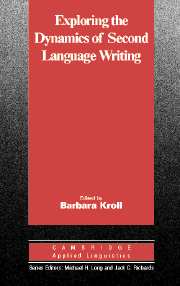Book contents
- Frontmatter
- Contents
- List of contributors
- Acknowledgments
- List of abbreviations used
- Series editors' preface
- Introduction: Teaching the next generation of second language writers
- I EXPLORING THE FIELD OF SECOND LANGUAGE WRITING
- II EXPLORING THE VOICES OF KEY STAKEHOLDERS:TEACHERS AND STUDENTS
- III EXPLORING WRITERS' FINISHED TEXTS
- IV EXPLORING CONTEXTUALITIES OF TEXTS
- V EXPLORING TECHNOLOGY
- EPILOGUE: EXPLORING OURSELVES
- Chapter 13 A challenge to second language writing professionals: Is writing overrated?
- Index
Chapter 13 - A challenge to second language writing professionals: Is writing overrated?
Published online by Cambridge University Press: 05 October 2012
- Frontmatter
- Contents
- List of contributors
- Acknowledgments
- List of abbreviations used
- Series editors' preface
- Introduction: Teaching the next generation of second language writers
- I EXPLORING THE FIELD OF SECOND LANGUAGE WRITING
- II EXPLORING THE VOICES OF KEY STAKEHOLDERS:TEACHERS AND STUDENTS
- III EXPLORING WRITERS' FINISHED TEXTS
- IV EXPLORING CONTEXTUALITIES OF TEXTS
- V EXPLORING TECHNOLOGY
- EPILOGUE: EXPLORING OURSELVES
- Chapter 13 A challenge to second language writing professionals: Is writing overrated?
- Index
Summary
Writing researchers and practitioners in English as a first language (L1) have long assumed that writing does or should play a central role in tertiary education, and indeed in the lives of educated citizens in a democracy. In the case of English as a second language (L2), the argument for a privileged role for writing in L2 learning had to be specifically made in the 1960s and 1970s as a challenge to audiolingual methods of language teaching, which had relegated writing to the position of least important of language skills. (See Matsuda, 2001, and this volume, for a somewhat different account.) The place of writing continued to rise through the mid 1970s up to the present, as textbooks, teacher education materials, and other published work on L2 writing have obligatorily listed the benefits to L2 learners of developing writing skills and explained the overriding importance of writing in academic contexts. In the mid 1980s, as a tangible sign of the increasing significance of writing, the Test of Written English was added to the TOEFL (Test of English as a Foreign Language) battery of tests, increasing the number of possible hoops for L2 English learners to jump through to gain access to English medium universities. Further underscoring the importance of writing, since the mid 1980s many tertiary institutions in the United States have required writing entrance, proficiency, and/or exit exams to ensure that those with weak writing skills would be weeded out of academic institutions, prevented from progressing within those institutions, or barred from graduating from them.
- Type
- Chapter
- Information
- Exploring the Dynamics of Second Language Writing , pp. 315 - 332Publisher: Cambridge University PressPrint publication year: 2003
Accessibility information
- 6
- Cited by

